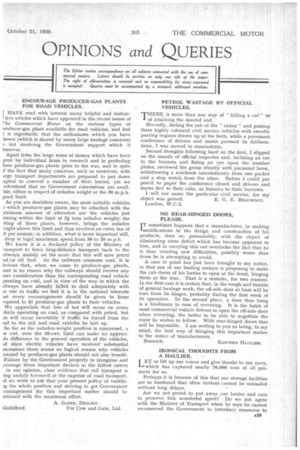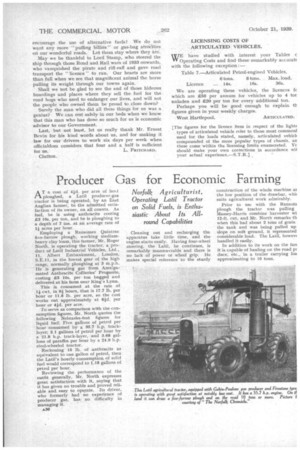OPINIONS and QUERIES The Editor invites correspondence on all subjects
Page 31

Page 32

If you've noticed an error in this article please click here to report it so we can fix it.
connected with the use of COM mercial motors. Letters should be written on only one side of the paper. The right of abbreviation is reserved and no responsibility for views expressed is accepted. Queries must be accompanied by a stamped, addressed envelope.
ENCOURAGE PRODUCER-GAS PLANTS FOR ROAD VEHICLES.
HAVE read with interest many helpful and instructive articles which have appeared in the recent issues of rile Commercial Motor on the various types of troducer-gas plant available for road vehicles, and feel t is regrettable that the enthusiasm which you have hown (which is shared by many large haulage concerns) s not receiving the Government support which it leserves.
Apart from the large sums of money which have been pent by individual firms in research and in perfecting hese producer-gas plants prior to the war, and in spite f the fact that many concerns, such as ourselves, with irge transport departments are prepared to put down apital to convert a number of their lorries, yet we nderstand that no Government concessions are availble, either in respect of unladen weight or the 30 m.p.h. peed limit.
As you are doubtless aware, the most suitable vehicles 3 which producer-gas plants may be attached with the iinirnum amount of alteration are the vehicles just oming within the limit of 21 tons unladen weight; the tting of these plants, however, brings the unladen 'eight above this limit and thus involves an extra tax of 3 per annum; in addition, what is more important still, drop in legal maximuni speed from, 30 to 20 M.p.h. We know it is a declared policy of the Ministry of ransport to force long-distance transport back to the tilways, mainly on the score that this will save petrol nclior oil fuel. As the railways consume coal, it is bvious that, when we come to producer-gas plants, iere is no reason why the railways should receive any tore consideration than the corresponding road vehicle perating on coal, and in view of the way in which the dlways have already failed to deal adequately with le rise in traffic we feel it is in the national interests iat every encouragement should be given to firms repa.red to fit producer-gas plants to their vehicles. We appreciate that loss of tax will occur on every .hicle operating on coal, as compared with petrol, but Lis will occur inevitably if traffic be forced from the lad to the rail and road .vehicles be laid up.
So far as the unladen-weight position is concerned, a w cwt. over the 50-cwt. limit can make no appreci)le difference to the general operation of the vehicles, td since electric vehicles have received substantial incessions there seems no logical reason why vehicles ierated by producer-gas plants should not also benefit. Failure by the Government properly to recognize and courage these important devices to the fullest extent in our opinion, clear evidence that rail transport is
ing unduly favoured at the expense of road transport. id we write to ask that your present policy of ventila, ig the whole position and striving to get Government couragement for this important matter should be ntinued with the maximum effort.
A. GATES, Director.
Guildford. For Cow and Gate, Ltd. PETROL WASTAGE BY OFFICIAL VEHICLES.
THERE is more than one way of " killing a cat" or A of attaining the desired end.
Recently, feeling the rub of the " ration " and passing three highly coloured civil service vehicles with sweetly purring engines drawn up at the kerb, while a pavement conference of drivers and mates pursued its deliberations, I was moved to remonstrate.
Second thoughts following hard on the first, I slipped on the mantle of official inspector and, inclining an ear to the bonnets and fixing an eye upon the number plates, reviewed the group silently with puckered brow, withdrawing a notebook ostentatiously from one pocket and a stop watch from the other. Before I could put pencil to paper the conference closed and drivers and mates fled to their cabs, as bunnies to their burrows.
I will not name the particular civil service, for my object was gained. E. G. E. BEAUMONT. London, W.C.2.
NO REAR-HINGED DOORS, PLEASE.
I T sometimes happens that a manufacturer, in making modifications to the design and construction of his products, does so, presumably, with the object of eliminating some defect which has become apparent to him, and in carrying this out overlooks the fact that he is thus creating new difficulties, possibly worse than those he is attempting to avoid.
A case in point has just been brought to my notice, in that one of our leading makers is proposing to make the cab doors of his lorries to open at the front, hinging them at the rear. That is a mistake, for two reasons. In the first case it is certain that, in the rough and tumble of general haulage work, the off-side door at least will be torn from its hinges, probably during the first week of its operation. In the second place, a door thus hung is a hindrance to ease of reversing. It is the habit of most commercial vehicle drivers to open the off-side door when reversing, the better to be able to negotiate the route he wishes to follow. With rear-hinged doors that will be impossible. I am writing to you as being, to my mind, the best way of bringing this important matter to the notice of manufacturers.
Norwich. EASTERN HAULIER.
IRONICAL THOUGHTS FROM A HAULIER.
LET us lift up our voices and give thanks to our navy, which has captured nearly 70,000 tons of oil products for us.
Perhaps it is because of this that our storage facilities are so burdened that often tankers cannot be unloaded without long delays.
Are we not proud to put away ,our lorries and cars to preserve this wonderful spirit? Do we not agree with the Minister of Transport when he says he cannot recommend the Government to introduce measures to
encourage the use of alternative fuels? We do not want any more " puffing billies " or gas-bag atrocities on our wonderful roads. Let them stay where they are..
May we be thankful to Lord Stamp, who steered the ship through those Road and Rail wars of 1933 onwards, who vanquished the pirate and riff-raff and gave road transport the " licence " to run. Our hearts are more than full when we see that magnificent animal the horse pulling its weight through our towns again.
Shall we not be glad to see the end of those hideous hoardings and places where they sell the fuel for the road hogs who used to endanger our lives, and will not the people who owned them be proud to close down?
Surely the man who did all these things for us was a genius? We can rest safely in our beds when we know that this man who has done so much for us is economic advisor to our Government.
Last, but not least, let us really thank Mr. Ernest Bevin for his kind words about us, and for making it law for our drivers to work six days per week when officialdom considers that four and a half is sufficient for us. L. PRITCHARD. Clutton. LICENSING COSTS OF ARTICULATED VEHICLES.
WE have studied with interest your Tables c Operating Costs and find these remarkably accurate with the following exception:—
Table 7.—Articulated Petrol-engined Vehicles.
6 tons. 8 tons. Max. load.
Licence ... 14s. 16s. 36s.
We are operating these vehicles, the licences fc which are £50 per annum for vehicles up to 4 tor unladen and £20 per ton for every additional ton.
Perhaps you will be good enough to explain th figures given in your weekly charges.
West Hartlepool. ARTICULATED.
[The figures for the licence item in respect of the lights types of articulated vehicle refer to those most common] used for the loads stated, namely, articulated vehicli compounded of the more popular types of chassis, an these come Within the licensing limits enumerated. Yc should make your own corrections in accordance wil your actual experience.—S.T.R.]




















































